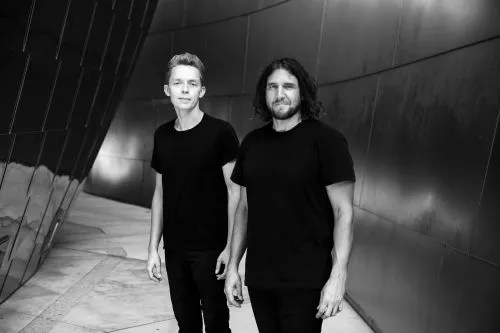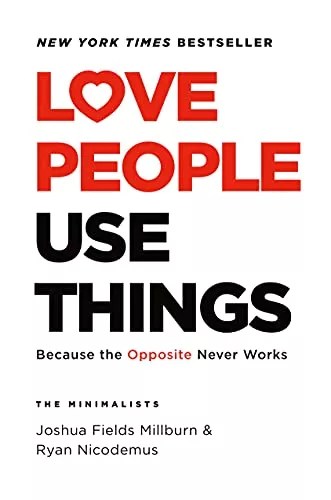
The Minimalists

Audio By Carbonatix
Joshua Fields Millburn and Ryan Nicodemus, a.k.a. The Minimalists, want to be clear: They’re not against owning stuff.
“It’s the consumerism. It’s the impulse buying. It’s the drunk shopping. Those are the things that people are looking for help with,” Nicodemus says.
For more than a decade, the pair have been spreading the gospel of mindful consumption, clutter reduction, and intentional living through blogs, books, and even Netflix documentaries.
Their latest book is Love People, Use Things: Because the Opposite Never Works, which discusses the role of minimalism in healing seven kinds of relationships: stuff, truth, self, money, values, creativity, and people.
They’re speaking here tonight, Thursday, September 23, at CB Live in Phoenix.
Phoenix New Times got the opportunity to speak with them about what to expect at the show, the new book, and how to get started on a journey of minimalism. Quotes have been edited for clarity.
Phoenix New Times: What can people expect from tonight’s show?
Nicodemus: Josh has a really mean dubstep routine. I’m really looking forward to it. [laughs] People can expect us to give a minimalist talk. Josh is going to read from the book. We’re going to record a live version of The Minimalists podcast and we’re going to answer a bunch of questions.
Tell us about the new book.
Nicodemus: It’s about healing the seven essential relationships in our life, and it really starts with our relationship with our stuff. We have a continuous, unfortunate relationship with our things in the Western world, especially in America. The average American household has 300,000 items in it, so we’ve got a lot of stuff. And that would be wonderful if it was making us happier, more joyous, more tranquil, more peaceful. But as you know, our things often do the opposite.
They’re causing a lot of discontent, a lot of stress in our lives, and of course, a lot of debt. So, so much debt. Which is actually another one of the relationships in the book – our relationship with money. It really starts with the stuff, though, because our material possessions are a physical manifestation of what’s going on inside us.

Celadon Books
If you’re anything like me, how I used to be, I had a lot of material clutter. I had a lot of stuff. Because really, I had a lot of internal clutter. That could be mental clutter, psychological clutter, spiritual clutter, relationship clutter, career clutter, financial clutter. All this stuff that’s going on inside us, it manifests outwardly in our things, and those things actually block a lot of our freedom.
How did the pandemic affect our clutter issues?
Millburn: A pandemic has a sneaky way of putting things in perspective, right? And for many of us, it kind of took a catastrophe to understand that an economy predicated on exponential growth is not a healthy economy. It’s a vulnerable one. If the economy collapses when people buy only the essentials, then that economy was never as muscular as we pretended it was.
In the new book, we describe the minimalist movement that first gained popularity maybe a decade or so ago, and then even more so after our first show came out on Netflix. But there was this problem of overconsumption and debt, and I think the last dozen years or so, we’ve started facing a different problem. It’s not just consumerism now; it’s decadence and distraction and during the pandemic, I really noticed that many folks who were grappling with that question that Ryan and I have been trying to answer for more than a decade now. That question is, “What is essential?”
Why did a lot of people go overboard on online shopping during the pandemic?
Nicodemus: I think it’s probably a few factors. The first thing that comes to mind is the impulsive behavior of us. And I say us, because that includes me and I have to be very careful what I act on. There’s not a lot of friction with online shopping, right? You’ve got one-click purchase, so it makes it really easy.
Millburn: One of the big ones is we feel this void. The void doesn’t actually exist; it’s been created by marketers and advertisers, by our peer group and our culture, by our society, that you are incomplete. And this is what consumerism is. Consumerism is merely the ideology that buying things is going to make me happy or more complete. And so if you’re told that enough, everyone wants to try it out for themselves. But the stuff doesn’t fill the void, it widens it. So we’re buying these things, getting this temporary satisfaction, but we’re not getting fulfillment from it. In fact, those things that we buy often become the objects that are making us miserable in many ways.
What do you think about apps like TikTok, where a lot of the content is about things to buy?
Nicodemus: TikTok, sure, but let’s talk about a lot of media in general. I remember when I first started my whole journey into minimalism, I realized that a lot of the entertainment I was consuming, it was sparking these impulses to go and buy things. We do have to be careful with the entertainment we consume, because if you’re getting a product for free, then you are actually the product. You are the one being sold. We’re not against TikTok. It’s more: What are you using that for?
Millburn: We think about our money as one of our resources, and it absolutely is, but it’s not the only resource we have. As Ryan said, these apps are all “free,” but they’re not really, because you’re spending your most precious resource on them. There’s no refund for misspent attention. And so TikTok is really good about aggregating your eyeballs on a whole bunch of videos. And not that that is bad or evil – our tools are only as good as the end user. It’s all about how we use the tools that we have.
What advice would you give to someone who wants to start changing their life by adopting minimalist principles?
Nicodemus: I think really, the first place to start is to ask yourself the question, “How would my life be better with less?” When I think about my minimalist journey and where it started, I was overwhelmed. I was working 60, 70, sometimes 80 hours a week. I had a ton of debt. I was pacifying myself with drugs and alcohol. My life was a tornado. So what I saw was an opportunity to reclaim my time, and that is where minimalism really helps me. Now, it might be different for somebody else. Maybe they just need to free themselves from clutter. That’s great. But getting to the why – that’s what’s really going to give people the leverage to start this journey and start building momentum
Millburn: And here’s the thing about the why, why it’s so important. Because I could tell you 67 ways to declutter your closet. But that’s not your problem. Your problem is not a shortage of decluttering tips. In fact, Ryan and I will tell you that decluttering alone does not work. Because you could go home today, declutter your closet, and a month from now it will be recluttered with a bunch of things if we don’t understand why we’re doing what we’re doing. But if we thoroughly understand the why, beginning with the question Ryan mentioned, then the how-to begins to take care of itself.
The Minimalists. 7 p.m. Thursday, September 23. CB Live, 21001 North Tatum Boulevard. Tickets are $35. Visit the CB Live website.